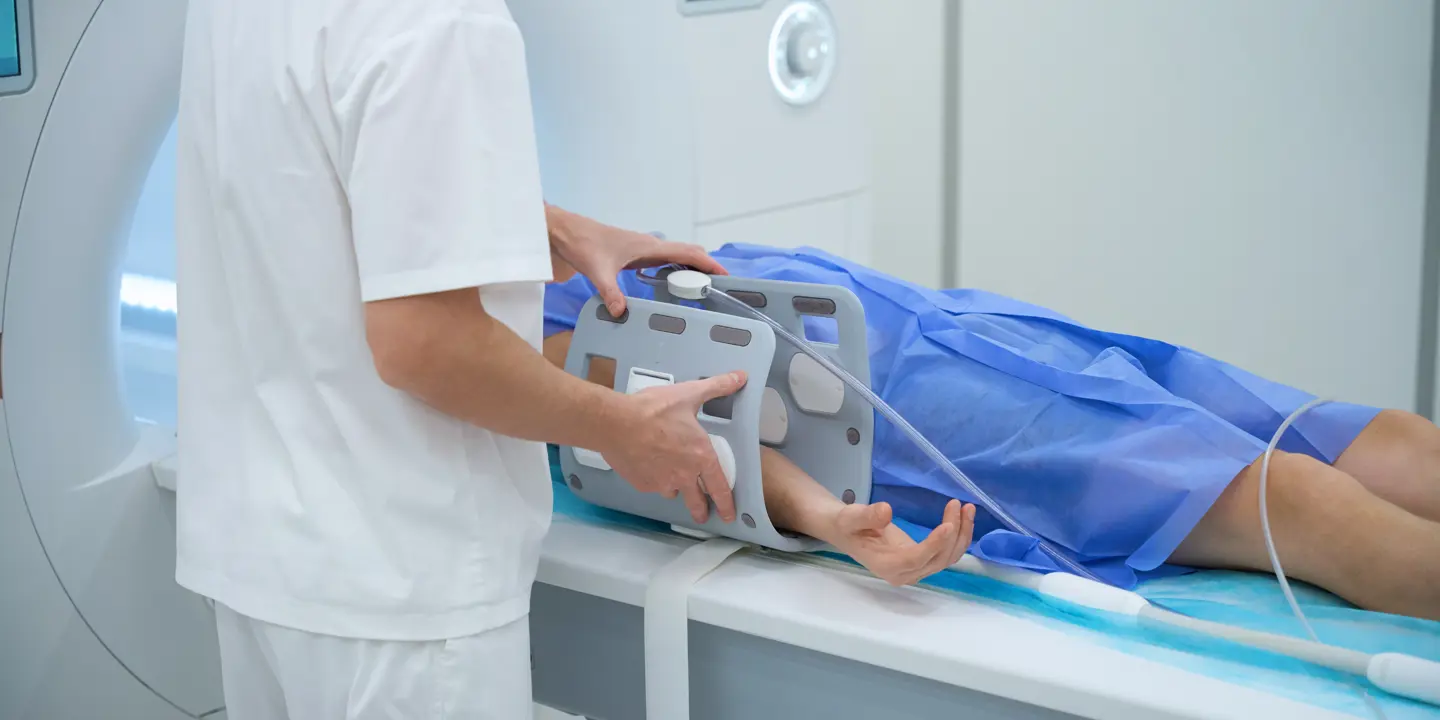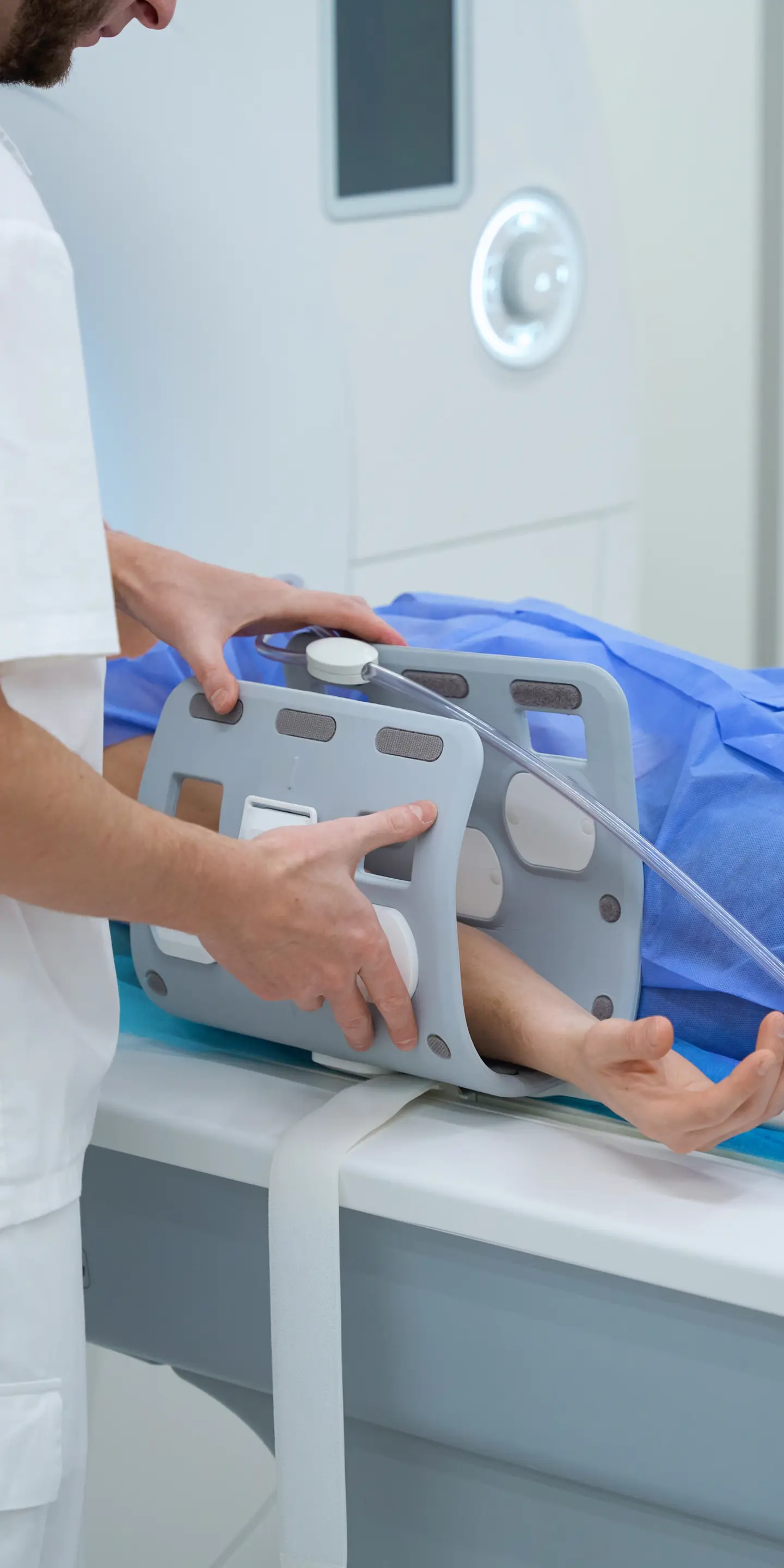Your medical scan checklist: what to bring and how to prepare
If you have unexplained symptoms, such as pain, discomfort, swelling, weakness or bleeding, your doctor may recommend that you have a medical scan.
Whether you are about to have a CT scan, Ultrasound scan, MRI scan or X-ray, you may be wondering ‘what should I bring with me to my scan?’.
It is helpful to know exactly how to prepare so that everything goes as smoothly as possible on the day of your scan. And that is what we will explore here.
Common Types of Scans
MRI Scans
MRI scanning, or magnetic resonance imaging, uses a combination of strong magnets to create magnetic fields around your body and radio waves to generate detailed images of the inside of your body. Unlike CT scans and X-rays, MRI scans do not use any ionising radiation.
They are useful in detecting a wide range of health conditions, including abnormal growths, such as those caused by cancer, and tissue damage due to disease or injury.
An MRI scanner is a tube-shaped machine with a scanner table on which you lie. The scanner table is then moved into the tube to perform your scan. The machine makes loud knocking, banging and buzzing noises while the images are captured.
Some people feel anxious when they find themselves in the enclosed space of an MRI machine. However, as the MRI machine allows for two-way communication, you can squeeze a call buzzer and speak to your care team and, if needed, ask for the scan to be paused or stopped.
CT Scans
A CT scan, or a computerised tomography scan, is an imaging procedure that uses X-rays and computing technology to create detailed cross-sectional images of the inside of your body. This includes your internal organs, blood vessels and bones.
They are particularly useful in detecting bone damage, issues with blood flow, abnormal growths and injuries.
A CT scanner comprises a large ring, which is often described as doughnut-shaped, and a scanner table. During your scan, the scanner table is passed through the ring and the ring rotates around your body.
Due to the use of X-rays, which is a type of ionising radiation, CT scans are not usually recommended during pregnancy. If needed, a doctor will discuss the risks and benefits with you. If the CT scan is not of your abdomen or pelvis, any potential risk to your baby is much lower.
Ultrasound Scans
An ultrasound scan does not use ionising radiation. Instead, it uses high-frequency sound waves, which are beyond the limit of human hearing, to create images of the inside of your body.
As the sound waves pass through your body, they are reflected when they encounter a boundary between different types of tissue. These reflected sound waves are detected by the ultrasound scanning device and are converted into electrical signals. The electrical signals are then converted into images.
Ultrasound scans are good at detecting soft tissue abnormalities such as major abdominal and pelvic organs as well as tendons, ligaments and muscles. In addition, due to the speed at which the images are captured, scans can be performed while you move. This means private ultrasounds can be helpful in diagnosing musculoskeletal injuries caused by movement or assess functioning of such muscles dynamically.
Unlike MRI scanners and CT scanners, the ultrasound scanner is a small handheld device, roughly the size of a microphone. They are safe to perform throughout pregnancy.
X-Rays
X-rays use a low level of ionising radiation to create images of the inside of your body. Most commonly, X-rays are used to create images of the bones and/or lungs.
When X-rays pass through your body, their energy is absorbed at different rates depending on the tissue. A nearby sensor detects the X-rays after they have passed through your body and these signals form images of the inside of your body.
Bones show up as solid white areas since they are more difficult for X-rays to pass through. This is why X-rays are particularly useful in investigating bone fractures and structural bone deformities such as scoliosis (curvature of the spine).
However, X-rays can also be used to detect issues with soft tissues, such as the lungs. They can, for example, help detect lung cancer, a chest infection and a collapsed lung (pneumothorax).
As with CT scans, the use of ionising radiation means that X-rays are not usually recommended during pregnancy.

How To Prepare For Different Types Of Scans
When you arrive for your scan, a member of your care team will ask you to confirm your personal details and fill in a health questionnaire.
The answers to your questionnaire will double-check whether it is safe for you to go ahead with your scan. This is because some scans and/or the use of a contrast agent are not suitable if you have certain health conditions.
For example, X-rays and CT scans are generally not recommended if you are pregnant as they use ionising radiation.
MRI scans may not be possible if you have certain metal implants that can be affected by the powerful magnets used during an MRI scan. These metal implants may include cochlear implants, aneurysm clips in your head or a non-MRI-conditional cardiac pacemaker. Modern pacemakers usually have an MRI mode that allows for MRI scanning when specific conditions are followed. Please ensure you notify the Radiographer when you attend if you have any metal inside or attached to you.
Depending on the type of scan you have, your care team may also check whether you have fasted for the appropriate amount of time. Fasting is usually required if you have a scan of your abdomen or with a contrast agent.
There are different types of contrast agents. These can be injected, or taken orally as tablets or a drink. They all increase the contrast of the images collected, which improves their clarity.
If you are having a bowel scan, you may be given a laxative to drink before your scan to empty or distend your bowel so clearer images can be captured.
Choosing Comfortable Clothing
Whichever type of scan you are having (ie an MRI scan, CT scan or X-ray), you will be advised to wear loose, comfortable clothing. Your clothes should not contain any metal such as zips, clasps, metal buttons or bra underwires.
You will be asked to remove any metal jewellery, and metal hair and body accessories. This includes piercings, clips, necklaces, brackets and watches. This is because metal items can interfere with the quality of the image; for example, distorting it or obscuring an area entirely. This could potentially lead to inaccurate results.
You will also need to remove any metal medical devices that are attached to the outside of your body. This can include glucose monitors, dentures and tethered insulin pumps. Hormone patches and nicotine patches that contain metal in their backings will also need to be removed.
You may find it easier to wear a separate top and bottoms, rather than a dress or one-piece outfit as this will make it easier to disrobe, if needed. If you need to remove all of your clothing, you will be given a hospital gown to wear.
Managing Personal Items And Valuables
Try to avoid bringing any valuable items to your scan. Any valuables that you need to bring along with you, such as your phone and money, can be stored in a secure locker at the scanning facility or you can bring a friend or family member to keep hold of them while you have your scan.
Dietary Considerations Before A Scan
You can eat and drink as usual before a CT scan, MRI scan or X-ray unless told otherwise.
If a contrast agent is needed, you will usually be asked not to eat for at least four hours preceding your scan and to only drink clear fluids during this time.
If you are having a heart scan, you may also be asked to avoid drinking caffeinated beverages as these can increase your heart rate and make it more difficult to capture clear images.
If you are having a scan of your abdomen, such as a bladder or bowel scan, you may be asked to drink a certain volume of water in the hour leading up to your scan. This will help enlarge your bowel and bladder so that clearer images of the tissue structures can be captured.
If you are having a bowel scan and have been given a laxative beforehand, you will be advised to drink water before and after your scan to avoid suffering from dehydration.
Relaxation Techniques For Scan Day
If you are feeling anxious about your scan, it can help to learn as much as possible about the scan you are having from reputable sources. Patient leaflets and authoritative online health websites are reliable and comprehensive sources of information about what to expect during the day of your scan.
You can also bring a friend or family member along with you to the scan to calm your nerves. Make sure you let your care team know that you are feeling nervous so they can take steps to make you feel as comfortable as possible.
For most scans, you will be required to stay as still as possible. It can help to practice breathing techniques, and visualisation and mindfulness exercises to lower your anxiety levels during your scan.
Remember, if you feel uncomfortable or panicked during your scan, you can tell your care team to pause or stop the scan.
Final Preparation: Double-Check Your List
To make sure you are ready for your scan, check that:
-
you know your medical information and history in order to complete your pre-scan health questionnaire - if you have any implant cards or records of surgery please bring them with you for an MRI scan
-
you have your insurance policy details if you are using insurance to cover the cost of your scan
-
you are wearing loose, comfortable clothing with no metal
-
you have removed any metal items from your clothing and body
-
you have fasted for the appropriate amount of time if you are having a scan with a contrast agent
-
you have read about and/or asked your care team to fully explain what to expect during and after your scan.
If you have unexplained symptoms that you would like investigated without delay or want to check that your health is on track, you can book a private MRI scan or private CT scan with Vista Health.
Sources
https://www.guysandstthomas.nhs.uk/our-services/mri/appointments
https://www.nhsinform.scot/tests-and-treatments/scans-and-x-rays/mri-scan/


